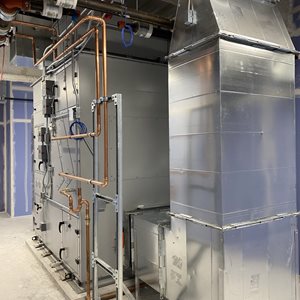Managing a fleet is a big part of a residential HVAC contractor’s business.
Customers are spread throughout a service area and technicians need to get to them in an efficient manner. With gas prices so high, every extra minute spent driving on the road eats away at an already thin profit margin.
On top of high gas prices, contractors must manage multiple logistics, including increased traffic, vehicle maintenance, supply chain disruptions, and weather, in addition to ensuring safe driving.
And the last two years have been worse than the previous 20 years in terms of rising costs, low production levels, and high demand, explained Dain Giesie, assistant vice president of Enterprise Fleet Management.
Embracing a variety of best practices and efficiency techniques can help recoup some of these added costs for residential HVAC contractors.
FUEL PRICES
Monthly gas and diesel prices in the U.S. have been steadily rising in 2021 and 2022 due to the impact of the COVID-19 pandemic on crude oil prices, as well as the war in Ukraine. As of June 1, the average regular gas price was at $4.67 and the average diesel price was $5.54.
With a fleet of 50 trucks, Barbie Simpson, owner of Simpson Sheet Metal in Santa Rosa, California, is very aware of high energy prices. “It’s having a huge effect on my bottom line,” she said. She used to give her drivers gas cards so they could fill up at local stations, but now she contracts with a company that provides fuel at commercial gas prices. “The pricing is competitive, and it keeps me from having to shop around.” Simpson has more work than ever, but fuel costs could force customers to drop planned projects. To prepare for uncertainty, she protects her profit margin by adding a gas surcharge clause when she bids new contracts. “This is a time to control costs.”
VEHICLE PURCHASING & REPLACEMENT PLANS
Almost nowhere else [besides where? this eludes to there being a blind decision]in the HVAC business do people make blind decisions. Managing your fleet needs to be grounded in math, with a very disciplined approach to the Total Cost of Ownership of each vehicle over time. “There’s a big difference between a plan and a strategy,” Giesie cautioned. “If you are making decisions without the math that gives a true understanding of the opportunity costs, you're making those decisions blind.”
By taking advantage of software, HVAC businesses can streamline operations to improve vehicle uptime and manage fleet maintenance.
Some companies like Enterprise Fleet Management offer free fleet study and analysis for contractors so they can see actionable ways working with a fleet management partner could impact their businesses before committing to purchase software.
A professional fleet management analysis can also determine which vehicles owners should buy and which vehicles are more cost effective to lease. Contractors need enough vehicles to capitalize on growth opportunities and take care of customers, but don't want unnecessary inventory weighing down performance. “It might be advantageous to rent part of your fleet so you can flex up and flex down to meet seasonal demand,” Giesie said.
The wrong kind of lease burdens commercial users. “I can't think of one application on the HVAC side where the closed-end lease is advantageous to the contractor. With open-ended equity leases, you have all the advantages of ownership in terms of flexibility, how long you keep it, how you use it, and the efficient deployment of capital. You unlock the equity at the back end and use that to drive costs down in your future fleet operations.”
Depreciation, fuel, and maintenance are the three largest expenses in fleet operations. “Whether you're financing, leasing, or paying cash, there is a point in time when that vehicle is as cheap as it's ever going to be to operate,” Giesie said. “Finding that point takes market experience and an understanding around residual values and maintenance projections.”
Fleet management software can determine how many cents per mile it costs to operate a vehicle, then maxes that cost out over different terms of use. The disruption of cycling out an old vehicle at the right time is far less than the hassle of dealing with breakdowns or spare vehicles.
Today, however, HVAC contractors are faced with the problem of limited vehicle availability amid high demand.
The U.S. market has pent- up demand for about 4 million vehicles that manufacturers cannot satisfy current production levels, Geisie said, adding that over the last 12 months, repair costs have increased around 17 percent with much longer lead times to have a vehicle repaired. “Delays exacerbate the costs, because when a vehicle is not working, it's costing the company revenue opportunity.”
Executing a proactive vehicle replacement cycle may not be possible with current supply constraints. “We're spending a lot of time helping our customers minimize the financial impacts of extending the lifecycle of their fleet because they can't get the expected number of new vehicles,” Giesie says. Oil changes, transmission fluids and filter services, and differential fluid changes all prevent unnecessary wear and stress on the motor.
Also, more major changes are on the horizon with electric vehicles growing in usage for residential HVAC contactors. “Because of the buzz around electric vehicles, many professional customers feel like they're behind, but they're not,” Giesie said. HVAC service contractors generally use vans to transport technicians and parts, and electric vans are still in the production cycle. Once the right vehicles are on the market, “there's absolutely a place for electric vehicles in the HVAC space.”
MAINTENANCE IS KEY TO REDUCING DOWNTIME
Whether or not it is possible to cycle out vehicles on schedule, proper tire inflation and engine maintenance help maintain fuel efficiency.
Giesie advised clients to avoid overloading. “Use an appropriate truck to haul any heavy equipment or trailers,” he said. Driver behavior is also crucial. “There's probably no bigger drain on fuel efficiency than harsh acceleration. Telematics technology can help monitor speed, watch idle time, and make sure that people aren't wasting gas sitting around in parking lots.”
SAFETY IMPROVES FLEET EFFICIENCY
When fleet costs are out of control, amplifying safety on the road can help maximize every gallon of gas, limit vehicle downtime, boost route efficiency, and increase profit.
Video or dash cams, as well as GPS tracking and vehicle monitoring, are tools Federated Insurance recommends to improve routes and monitor driver behavior.
GPS can provide vehicle location and daily routes to improve plans over time and to make smart decisions on route changes when you need to respond to a customer quickly. Federated Insurance says you can also monitor speed and break usage and have video coverage should a collision occur so help support your claim if it’s not your driver’s fault, saving you unnecessary additional costs.
“When people call with complaints about our drivers,” Simpson says, “our dispatcher has the data to show what really happened.”





_1.jpg?height=300&resizemode=force)